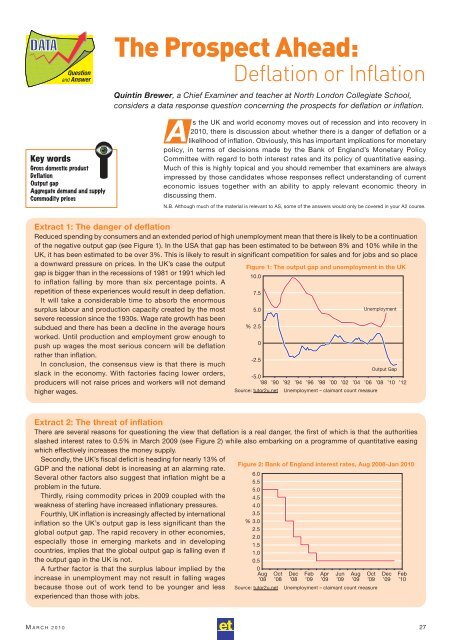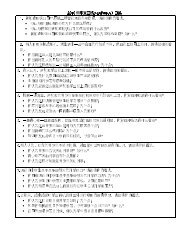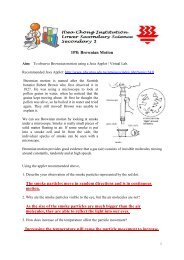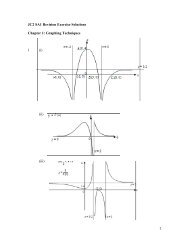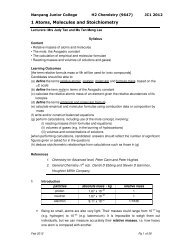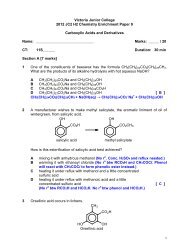Eco Today - Mar10:ET Master Page 2007 - ASKnLearn
Eco Today - Mar10:ET Master Page 2007 - ASKnLearn
Eco Today - Mar10:ET Master Page 2007 - ASKnLearn
Create successful ePaper yourself
Turn your PDF publications into a flip-book with our unique Google optimized e-Paper software.
Key words<br />
Gross domestic product<br />
Deflation<br />
Output gap<br />
Aggregate demand and supply<br />
Commodity prices<br />
The Prospect Ahead:<br />
Deflation or Inflation<br />
Quintin Brewer, a Chief Examiner and teacher at North London Collegiate School,<br />
considers a data response question concerning the prospects for deflation or inflation.<br />
A<br />
s the UK and world economy moves out of recession and into recovery in<br />
2010, there is discussion about whether there is a danger of deflation or a<br />
likelihood of inflation. Obviously, this has important implications for monetary<br />
policy, in terms of decisions made by the Bank of England’s Monetary Policy<br />
Committee with regard to both interest rates and its policy of quantitative easing.<br />
Much of this is highly topical and you should remember that examiners are always<br />
impressed by those candidates whose responses reflect understanding of current<br />
economic issues together with an ability to apply relevant economic theory in<br />
discussing them.<br />
N.B. Although much of the material is relevant to AS, some of the answers would only be covered in your A2 course.<br />
Extract 1: The danger of deflation<br />
Reduced spending by consumers and an extended period of high unemployment mean that there is likely to be a continuation<br />
of the negative output gap (see Figure 1). In the USA that gap has been estimated to be between 8% and 10% while in the<br />
UK, it has been estimated to be over 3%. This is likely to result in significant competition for sales and for jobs and so place<br />
a downward pressure on prices. In the UK’s case the output<br />
Figure 1: The output gap and unemployment in the UK<br />
gap is bigger than in the recessions of 1981 or 1991 which led<br />
10.0<br />
to inflation falling by more than six percentage points. A<br />
repetition of these experiences would result in deep deflation.<br />
7.5<br />
It will take a considerable time to absorb the enormous<br />
surplus labour and production capacity created by the most<br />
severe recession since the 1930s. Wage rate growth has been<br />
subdued and there has been a decline in the average hours<br />
worked. Until production and employment grow enough to<br />
push up wages the most serious concern will be deflation<br />
5.0<br />
% 2.5<br />
0<br />
Unemployment<br />
rather than inflation.<br />
-2.5<br />
In conclusion, the consensus view is that there is much<br />
Output Gap<br />
slack in the economy. With factories facing lower orders,<br />
-5.0<br />
producers will not raise prices and workers will not demand<br />
’88 ’90 ’92 ’94 ’96 ’98 ’00 ’02 ’04 ’06 ’08 ’10 ’12<br />
higher wages.<br />
Source: tutor2u.net Unemployment – claimant count measure<br />
Extract 2: The threat of inflation<br />
There are several reasons for questioning the view that deflation is a real danger, the first of which is that the authorities<br />
slashed interest rates to 0.5% in March 2009 (see Figure 2) while also embarking on a programme of quantitative easing<br />
which effectively increases the money supply.<br />
Secondly, the UK’s fiscal deficit is heading for nearly 13% of<br />
GDP and the national debt is increasing at an alarming rate.<br />
Several other factors also suggest that inflation might be a<br />
problem in the future.<br />
Thirdly, rising commodity prices in 2009 coupled with the<br />
weakness of sterling have increased inflationary pressures.<br />
Fourthly, UK inflation is increasingly affected by international<br />
inflation so the UK’s output gap is less significant than the<br />
global output gap. The rapid recovery in other economies,<br />
especially those in emerging markets and in developing<br />
countries, implies that the global output gap is falling even if<br />
the output gap in the UK is not.<br />
A further factor is that the surplus labour implied by the<br />
increase in unemployment may not result in falling wages<br />
because those out of work tend to be younger and less<br />
experienced than those with jobs.<br />
Figure 2: Bank of England interest rates, Aug 2008-Jan 2010<br />
%<br />
6.0<br />
5.5<br />
5.0<br />
4.5<br />
4.0<br />
3.5<br />
3.0<br />
2.5<br />
2.0<br />
1.5<br />
1.0<br />
0.5<br />
0<br />
Aug<br />
’08<br />
Oct<br />
’08<br />
Source: tutor2u.net<br />
Dec<br />
’08<br />
Feb<br />
’09<br />
Apr<br />
’09<br />
Jun<br />
’09<br />
Aug<br />
’09<br />
Oct<br />
’09<br />
Unemployment – claimant count measure<br />
Dec<br />
’09<br />
Feb<br />
’10<br />
M ARCH 2010 27


